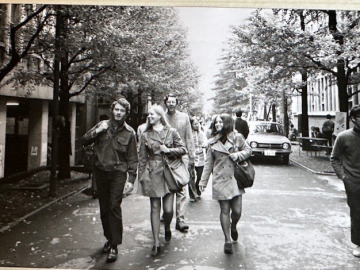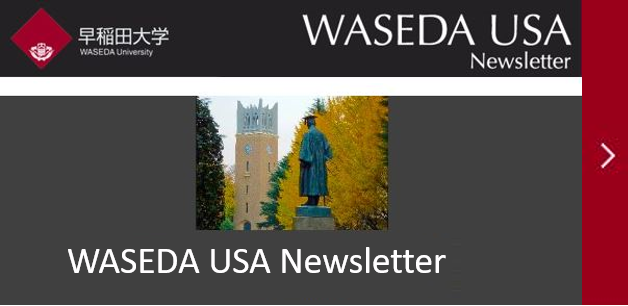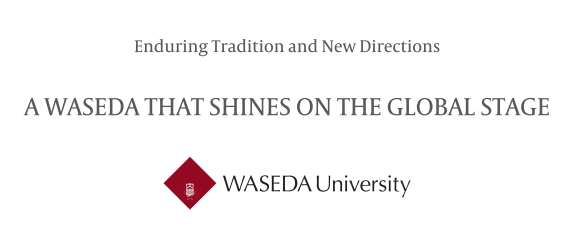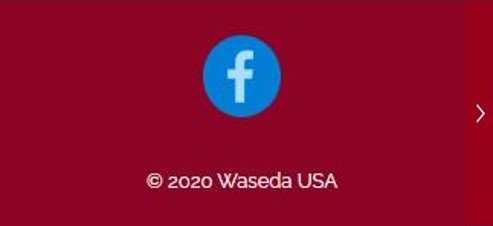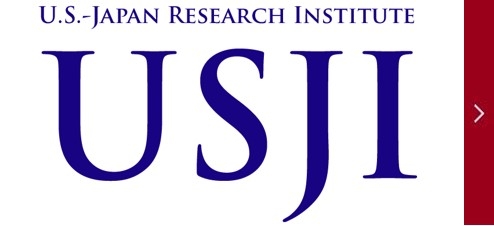Wing Kwan Leung
Waseda Kokusaibu 1984-85
A Journey of Serendipity and Self-Discovery Through Waseda University
(日本語は英語の次にあります)
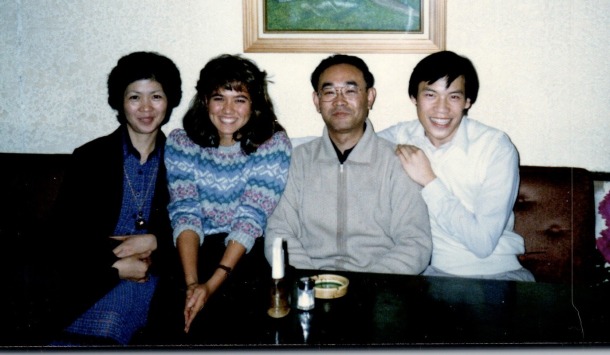
[with host family]
When I was seventeen years old, long before emails and texts existed in 1980, I had a pen pal in Japan. We corresponded by snail mail for several years. She would send me cassette tapes of her favorite songs, and I vividly remember two of them: “Daitokai” by Crystal King and “Gandhara” by Godiego. At that time, my musical influences mostly came from my sisters, who listened to Cantonese pop, but I also found myself drawn to the surge of Japanese-influenced music taking over the radio waves in Hong Kong. Despite the historical animosity between China and Japan—stemming from Japan’s invasion of China during World War II—this new generation of Chinese-Americans, like myself, was not bound by the past. We were eager to embrace a diverse range of cultural influences. Even though we lived in Los Angeles, Chinatown was a haven for imported albums from Hong Kong, and it was there that I became hooked on Japanese music.
After high school, I was accepted to USC, UCLA, and CSULA (California State University, Los Angeles). I chose CSULA, not for its prestige, but simply because it was the closest to home, and I didn’t want to endure long commutes. Since I was already passionate about Japanese music, I decided to take Japanese language courses. I breezed through them effortlessly, and by my second year, Professor Yasuhara encouraged me to apply for the Waseda International Exchange Program. So, at twenty years old, I faced a monumental decision: to study abroad in Japan—a decision that would change my life forever.
In August 1984, I said goodbye to my family and boarded a flight to Tokyo, unaware of the profound impact this journey would have on me. My parents, especially my mother, who had escaped the Japanese military’s bombing of her village in China, were strongly opposed to my decision. For them, it felt like a betrayal to our heritage. But for me, it was an opportunity to explore, to grow, and to understand the very culture that had fascinated me for so long.
My life has always been guided by serendipity. When opportunity knocks, I’ve learned to take it. That’s exactly what I did when I arrived at Waseda University. My homestay parents, Hide and Yasuo Sugiyama, already had three boys but welcomed me into their family with open arms. I didn’t know it at the time, but Waseda was one of the oldest and most prestigious universities in Japan. I was just a kid from a working-class family in Los Angeles, unfamiliar with the world beyond my own neighborhood. Yet, Waseda opened a new world to me—one that would shape my future in ways I never expected.
Up until that point, I had coasted through high school and college without anyone ever telling me I had the potential to achieve something great. My parents had emigrated from Hong Kong to give their children a better life, but they were too preoccupied with surviving in a new country to focus on my grades or praise my achievements. Though I was an “A” student, I never heard words of encouragement from them. But at Waseda, something changed.
When I told people I attended Waseda University, their reactions were nothing short of inspiring. Strangers, impressed by the name, would often compliment me. They saw something in me that I hadn’t recognized in myself—a smart, capable individual. Waseda gave me more than just an education; it gave me confidence, and that confidence, along with the kindness of my host parents, became the foundation for my future. They believed in me more than I believed in myself. Their kindness and encouragement became a driving force in my life.
By the end of my year at Waseda, my homestay parents offered to let me stay with them permanently. Deep down, I longed to remain in Japan, but my obligation to complete my college education in the United States was too great. I couldn’t abandon my parents’ dreams for me. So, I returned to California, graduated with a degree in Japanese, and began my career. Unfortunately, my Japanese fluency has since faded, but my connection to the culture remains strong.
I took a job at JTB (Japan Travel Bureau), but it didn’t fulfill me, and I eventually moved on to teaching. In a serendipitous turn, I applied to be a substitute teacher and found myself entering a new phase of life. Through California’s Intern Program, I became an elementary school teacher, eventually earning a master’s degree in educational administration and becoming an elementary school principal in 2006. As a principal, I actively encouraged college matriculation. Every Wednesday, I would wear my “Waseda” shirt to school to promote the goal of higher education to my students.
Since retiring on January 6, 2025, after 36 years in education, I look back on my journey with gratitude. The experiences I gained at Waseda not only provided me with academic knowledge but also a group of lifelong friends. My cohort from the 1984-1985 exchange program remains one of the most incredible and kind-hearted groups of people I have ever known. In October 2024, we gathered in Tokyo for our 40th reunion, reconnecting with old friends and reflecting on how much we had all grown over the years.
Life is unpredictable. If I had attended USC or UCLA instead of CSULA, I would have missed out on the serendipitous opportunity to study at Waseda. I would have missed out on the 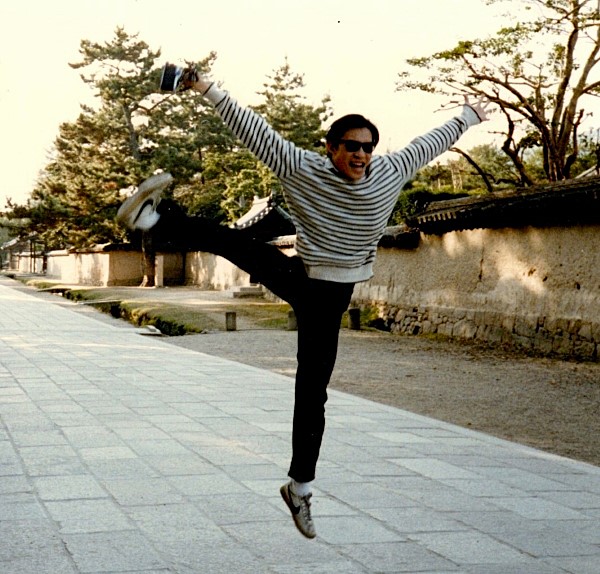 experiences that shaped who I am today. Four things, in particular, have blessed my life: 1) being born into a family with five wonderful siblings; 2) my parents’ sacrifice and courage in immigrating to the United States; 3) the Waseda experience, which enriched my life in countless ways; and 4) being married to my husband, Joe Salvemini, for 21 wonderful years.
experiences that shaped who I am today. Four things, in particular, have blessed my life: 1) being born into a family with five wonderful siblings; 2) my parents’ sacrifice and courage in immigrating to the United States; 3) the Waseda experience, which enriched my life in countless ways; and 4) being married to my husband, Joe Salvemini, for 21 wonderful years.
I hope I’ve made both of my parents and my homestay parents proud, and I will continue to pass on the lessons of confidence, kindness, and strength to everyone I meet. Life is a journey, and sometimes the best experiences come when you least expect them. Be open to serendipity—it’s okay to embrace the unknown.
ウィング クァン リウング
早稲田大学旧国際部 1984~1985年
早稲田大学留学を通しての、セレンディピティと自分探しの旅
1980年、まだ電子メールが登場するずっと前のことですが、当時私は17歳で、日本に文通相手がいました。私たちは数年にわたり文通し、彼女が私にお気に入りの曲をおさめたカセットテープを送ってくれたことがありました。その中で私が鮮明に覚えている2曲は、クリスタルキングの「大都会」と、ゴダイゴの「ガンダーラ」です。その当時、私は広東ポップスを聴いていた姉たちから音楽の影響をかなり受けていましたが、香港のラジオを席巻していた日本風の音楽にも惹かれていました。第二次世界大戦に端を発する日中間の歴史的な反目の関係性にもかかわらず、私のような中国系米国人の新しい世代は、過去に縛られることはありませんでした。私たちは、多様な文化に触れることを、しきりに求めていました。ロサンゼルスに住んでいたとはいえ、チャイナタウンに行けば香港からの輸入アルバムが豊富にあり、そこで私は日本の音楽に夢中になりました。
高校卒業後、私はUSC、UCLA、CSULA(カリフォルニア州立大学ロサンゼルス校)に合格しました。その中からCSULAを選んだのは、名門だからというわけではなく、単に家から一番近かった上に、長い通学時間に耐えたくなかったからです。すでに日本の音楽に熱中していた私は、日本語のコースを取ることに決めました。日本語の授業は難なくこなした私が2年生になると、安原教授が早稲田大学の交換留学プログラムに応募するよう勧めてくれました。そこで重大な決断を迫られた20歳の私は、日本への留学を決意したのです。それはその後の私の人生を変える大きな決断でした。
1984年8月、私は家族に別れを告げ、東京行きの飛行機に乗りました。この時の私は、この留学が私に多大な影響を与えることになるとはまだ知りませんでした。私の両親、特に母は、日本軍による攻撃にあった中国の村から逃れてきたため、私の決断に強く反対しました。両親にとっては、私たちの歴史に対する裏切りのように感じられたからでしょう。しかし私にとって日本への留学は、探求し、成長し、長い間私を魅了して止まなかった文化を理解するチャンスの到来でした。
私の人生は常にセレンディピティ(偶然の出会い)に導かれてきました。チャンスが巡ってきたら、それを掴むようにしてきました。早稲田大学に来たことも、まさにそうでした。私のホームステイ先の両親、杉山秀さんと靖夫さんにはすでに3人もの男の子がいましたが、温かく私を家族に迎えて入れてくれました。当時は知りませんでしたが、早稲田大学は日本で最も古く、最も権威のある大学のひとつでした。私はロサンゼルスの労働者階級の家庭に生まれ、自分の住む地域以外の世界には馴染みのないただの子どもでしたが、早稲田大学は私を、新しい世界へと、予想もしなかった形の未来へと導いてくれました。
それまで私は、自分が何か偉大なことを成し遂げる可能性があると言われることもなく、高校と大学をなんとなく過ごしてきました。私の両親は、子供たちにより良い生活をさせるために香港から移住してきましたが、新しい国で生き抜くことに必死で、私の成績に注目したり、私の功績を褒めたりする余裕はありませんでした。私の成績はいつも “A”でしたが、両親から励ましの言葉を聞くことはありませんでした。しかし早稲田では、何かが変わったのです。
私が早稲田大学に通っていることを告げると、人々は皆感心していました。その名前を聞いただけで、見知らぬ人でさえも感銘を受け、しばしば私を褒めてくれました。彼らはその大学名を通して私の中に、私自身も気づかなかった、賢くて有能な人物を見ていたのです。早稲田大学は私に教育を与えてくれただけではなく、自信を授け、その自信はホームステイ先の両親の優しさとともに私の将来の土台となりました。彼らは、私が自分自身を信じる以上に、私のことを信じてくれました。彼らの優しさと励ましは、私の人生の原動力となりました。
早稲田での1年間が終わるころ、ホームステイ先の両親が、彼らの元にこのまま永住しないかと申し出てくれました。心の底では日本に残りたいと願っていましたが、私にはアメリカでの大学教育を修了しなければならないという大きな義務がありました。アメリカにいる両親の夢を裏切ることはできませんでした。結局私はカリフォルニアに戻り、日本語の学位を取得して卒業し、キャリアをスタートさせました。残念ながら、私の日本語は流暢ではなくなってしまいましたが、日本文化とのつながりは強く残っています。
私はJTB(日本交通公社)に就職しましたが、満足できずに、教職に就くことになりました。ひょんなことから私は代行教員に応募し、人生の新たな局面を迎えることになったのです。カリフォルニア州のインターン・プログラムを通じて小学校教諭となり、最終的には教育管理学の修士号を取得し、2006年には小学校の校長になりました。校長として、私は大学進学を積極的に奨励しました。毎週水曜日、私は「早稲田」のシャツを着て登校し、生徒たちに大学に進学するという目標を持つよう勧めました。
2025年1月6日に退職して以来、36年間教育に携わってきましたが、私は感謝の気持ちを持って自分のこれまでの歩みを振り返っています。早稲田大学で得た経験は、学問的な知識だけでなく、私に生涯の友たちをも与えてくれました。1984年から1985年にかけての交換留学プログラムで出会った同期の仲間は、今でも私が知る中で最も素晴らしく、心優しい人たちです。2024年10月、私たちは40回目の同窓会のために東京に集まり、旧友と再会し、年月を重ねて私たち全員がどれほど成長したかを振り返りました。
人生は予測不可能です。もしCSULAではなくUSCやUCLAに通っていたら、早稲田で学ぶというセレンディピティ(偶然の機会)も、今の私を形作っている素晴らしい経験も逃していたでしょう。特に私の人生を祝福してくれた4つの出来事をここに記します。
1)5人の素晴らしい兄弟がいる家庭に生まれたこと
2)アメリカに移住した両親の犠牲と勇気
3) 私の人生を数え切れないほど豊かにしてくれた早稲田での経験そして
4)夫のジョー・サルヴェミニと結婚して21年になること
私はアメリカの両親にもホームステイ先の両親にも誇りに思ってもらえていると思います。そして、これからも出会う人すべてに、自信、優しさ、強さという教訓を伝えていきたいと思います。人生は旅であり、思いもよらないときに最高の経験ができることもあるのです。セレンディピティ(偶然の出会い)に対してオープンであれ。未知なるものを受け入れても良いのです。

